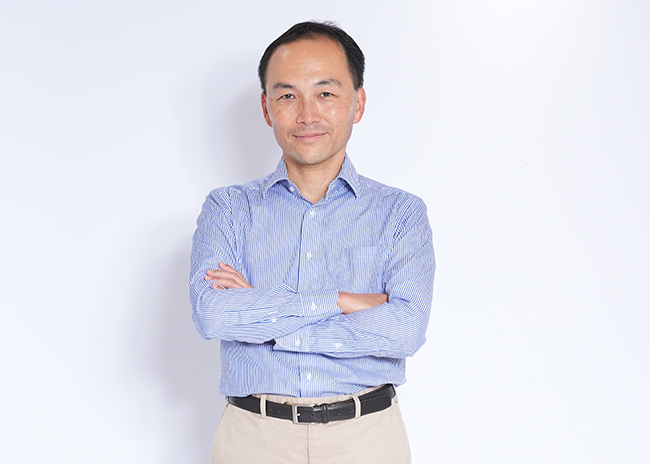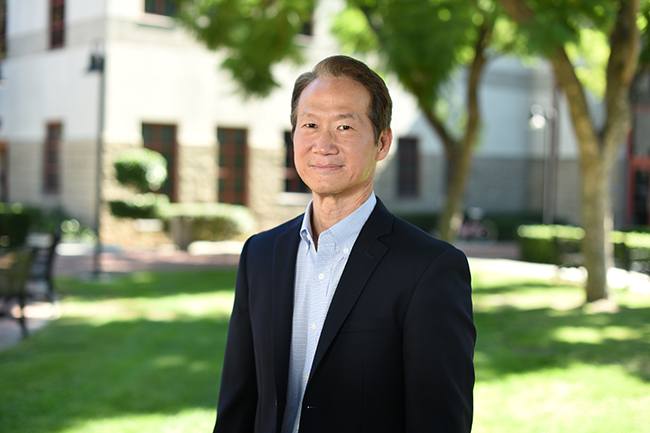Give peace a chance … really: Universal Peace Conference next week at CGU

Tomomasa Yagisawa is one two of the organizers of the September 19 annual Universal Peace Conference at Claremont Graduate University’s Albrecht Auditorium. Photo/by Akito Iwamoto
by Lisa Butterworth | Special to the Courier
“Give peace a chance,” is not a novel refrain, but at the Annual Universal Peace Conference held at Claremont Graduate University, scholars, students, and community members will be encouraged to think about new ways to do just that. The conference will take place at Albrecht Auditorium, and via Zoom for global participants, on Thursday, September 19, from 5 to 7 p.m. — all are welcome.
Steven Kim and Tomomasa Yagisawa, two of the conference organizers, are both alums of CGU’s Drucker School of Management. And it’s the ideas of Peter Drucker, the “father of modern management” the school is named for, and who taught there for more than 30 years, that will inspire much of the evening’s discourse.
Drucker, who died in 2005, was an advisor to some of the world’s biggest organizations — including General Electric, Toyota, Girl Scouts of the USA — and governments, and spent much of his life supporting the nonprofit sector. “He believed that businesses should serve some greater good beyond just making money as part of his idea of a functioning society,” Kim said. And though Drucker didn’t specifically use the word “peace,” that was essentially the outcome of the “functioning society” he pursued, where every person has a role. “This year, we are basing [the conference] on his ideal thought,” Yagisawa said.
As global conflicts continue to escalate, the event feels more relevant than ever. Since the conference’s origination several years ago, the war in Ukraine has intensified, and the conflict in Gaza erupted after last year’s gathering. “We haven’t been successful in preventing those. Our impact is really small right now,” Yagisawa said. “But the importance is getting bigger.”
For the organizers, it’s also important to lay out what the conference is not, particularly because of the incendiary nature of the world’s most visible conflicts. “Peace could be anything,” Yagisawa said. “So we are clearly stating that this is not political or religious, but we are universal. We are not biased or standing on one side. This year we are focusing on higher education and leadership,” which, he hopes, will allow attendees to address issues of peace and war not with emotion, but “carefully, with wisdom.”
Kim agreed: “The whole idea of the Universal Peace Conference is to create a greater awareness that can lead to a more peaceful world based on universal principles that go beyond just political, economic solutions, and certainly not military solutions. What are the universal principles that can promote a more peaceful world, and what are the barriers that get in the way of a peaceful world?”
In our current culture’s polarized state, simply creating space for respectful discourse is a start. “One of those barriers is disunity and prejudice and this us versus them mentality that is very detrimental to a peaceful world,” Kim said. “Because when you think of yourself as us versus them, you start to think of the other as evil, as the bad guys, and you’re the good guys. And it’s very insidious. Hopefully we can promote a more constructive dialogue around how we can remove some of those barriers.”
The Annual Universal Peace Conference is hosted by the Universal Peace Connection, a group that began in 2020 when Yagisawa, who lives in Tokyo where he works for a pharmaceutical company, was asked to help organize a virtual event around Peace Day, a day the United Nations General Assembly designated as a period of non-violence and cease-fire. One of his Drucker School of Management professors, Jean Lipman-Blumen, attended the event and proposed that the group gather regularly. From their monthly meetings, an alliance was created that, as their website states, is “proof of the possibility that people from countries once in the state of war can be friends and take mutual actions toward peace.” The group has since grown to reflect an even more global connectivity, reflected in the conference’s subject matter.
The evening will open with a keynote address by Kim, who lives in Upland where he is the principal of Talentscope, an outsourced hiring and HR firm. His talk will be followed by a short lecture and panel discussion on the conference’s two main theories: Lipman-Blumen’s Connective Leadership Model and Peter Drucker’s management concepts, both of which aim to ease tensions in our increasingly diverse world. The idea of servant leadership, or putting the needs of those managed first, is important to creating a more peaceful world, said Kim, “because [those leaders] can set the context of how we can interact with one another based on universal principles that transcend political agendas.”

Steven Kim is one two of the organizers of the September 19 annual Universal Peace Conference at Claremont Graduate University’s Albrecht Auditorium. Photo/by Akito Iwamoto
Paraphrasing the words of Abdu’l-Bahá, one of the central figures of the Bahá’i faith, Kim added: “There’s this idea: the clashing of differing perspectives creates a spark of truth. If they can create that safe space where people can offer differing perspectives without being insulting to one another, a leader can play a valuable role and then also help cast a vision of what a more peaceful world would entail as far as this feeling of oneness — there’s this one planet with one people. Setting that vision, I think, would be immensely helpful for people to operate within.”
Both Kim and Yagisawa have hopes for the conference to be more than just “a lot of great talks,” also offering small but powerful actions. Yagisawa relayed another of Peter Drucker’s famous quotes: “Don’t tell me that we had a great conversation. Rather, please tell me what would you do on Monday?” Ultimately, they want to offer attendees a new perspective.
“For me, if they feel like peace is about us, that’s kind of simply enough. To have them feel like, ‘Oh, I can do something, [have] some small impact,’” Yagisawa said. Kim added, “This feeling of ‘we,’ that truly the earth is but one country — mankind, its citizens. If they can come away with this greater sense of ‘we’ then I think the solutions that come out of that mindset, that change of heart, will be much more productive and more enduring and conducive to a functioning society, which includes the interest of all people.”
The Annual Universal Peace Conference takes place from 5 to 7 p.m. Thursday, September 19 at Claremont Graduate University’s Albrecht Auditorium, and via Zoom. To register or for more information, go to universal-peace-connection.jimdosite.com/annual-universal-peace-conference-2024.







0 Comments